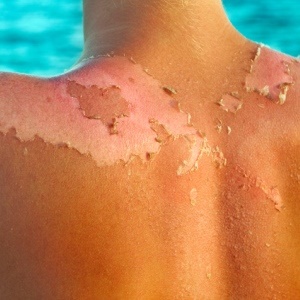
1. Mist your mug
Your skin wins your body’s prize for “most likely to get cancer”. Every morning, dermatologist Joseph Sobanko of the University of Pennsylvania, uses generic broad-spectrum SPF 30 sun-screen with either zinc or titanium dioxide. And he shuts his eyes and sprays an even coat on his face. Every morning.
Read more: 6 things we learnt on testicular cancer, with Cancercare’s Dr Greg Hart
2. Wrap it up
A diet rich in vegetables, fibre, and omega-3 fats can curb inflammation and help fight cancer. Philippe Spiess, a genito-urinary oncologist at Moffitt Cancer Centre, eats what he calls a “power egg breakfast wrap”. He heats 1⁄4 cup of frozen spinach in a pan and mixes it with an egg and 200 millilitres (nearly a cup) of egg white. The cooked mixture then goes into a wholewheat wrap with a pinch of cheese, a third of an avocado, and a tablespoon of chilli sauce. To ensure good sleep at night – when cell repair occurs – he takes a melatonin supplement 30 minutes before bed, in pill or chewable gummy form.
Read more: I survived testicular cancer. Here’s why you should get your balls checked
3. Pop low-dose aspirin
Aspirin does more than soothe aches and stifle heart attacks; it curbs colon inflammation. Daniel Rosenberg, director of the Colon Cancer Prevention Programme at University of Connecticut Health, tells everyone he knows to take 81mg a day. Ask your doctor first, because some people run the risk of excessive bleeding. “If your doctor approves, you should do it,” he says. In a study review in Annals of Internal Medicine, people who took 75 to 1 200mg of aspirin daily for at least a year reduced their risk of dying of colorectal cancer by 33% over 20 years.
4. Pitch plastic
June Chan, a professor of urology at UC San Francisco, packs her lunch – but not in plastic, which may contain cancer-promoting chemicals. She packs salad (kale, feta, pumpkin seeds, raisins) in a glass jar. For more substantial grub, go with the three-layer stainless-steel lunchbox.
Read more: This is the most important health check you can do at home
5. Sweat for 75 to 150 minutes
Keith McCrae, an oncologist with Cleveland Clinic Cancer Institute, works long hours but fits in exercise six days a week. He loves road biking 40 to 50 kilometres most weekdays, more on weekends. A study in JAMA Internal Medicine found that people who did 1.25 hours of vigorous or 2.5 hours of moderate activity a week had a 31% lower risk of dying of cancer than those who didn’t work out. Exercise helps tame inflammation, possibly reducing cancer risk.
6. Take a skin supplement
Anthony Rossi, a dermatologist at Memorial Sloan Kettering Cancer Centre, takes nicotinamide each morning with water and food. Nicotinamide is a form of vitamin B3 that may reduce the formation of certain skin cancers, possibly by blunting the cell damage induced by UV rays. (But taking it doesn’t exempt you from using sunscreen.) Always check with your doctor before starting a new supplement, of course.
7. Bolt down some nuts
When Matthew Yurgelun, a medical oncologist at Dana-Farber Cancer Institute, needs a snack, he eats almonds or pistachios. “It’s a great way to quell hunger and keep me from snacking on fatty or sugary foods that can contribute to weight gain and obesity-related diseases, such as cancer,” he says.
A US National Institutes of Health study even showed that smokers who snacked on nuts reduced their risk of lung cancer, possibly because nuts curb oxidative stress associated with smoking. Eat 20 to 24 nuts a day. Carry them in a small Tupperware, or try Proper Snacks Snack Packs.
8. Order the fish
UCLA urologist Christopher Saigal, eats fish but not meat. A typical dinner is a salmon fillet with brown rice and vegetables. Try it twice a week. “I tell patients that ‘heart-healthy’ foods have been associated with a lower risk of developing prostate cancer, and a lower risk of progression of prostate cancer after diagnosis.” Plus, a UK study review linked red and processed meats with colorectal cancer.
9. Calm the hell down!
Chronic stress can feed cancer. Here’s your 15-minute prescription from urologist Nelson Bennett, of Northwestern University Feinberg School of Medicine: sit with the door closed, phone silenced. Inhale deeply through your nose and exhale from your mouth 10 times. Close your eyes and notice the sounds around you – even the hum of fluorescent lights. Then bring your thoughts to your breaths. Don’t worry if your mind wanders.
It took Bennett about 15 sessions to get comfortable. “The more I practised it, the easier it got,” he says. You’ll get positive reinforcement: less stress with deadlines, and better focus on demand.
Read more: I was young, rich, and successful – and had crippling anxiety. Here’s how I beat it
10. Start the day green
Green tea is packed with antioxidants. Alan Wan, a medical oncologist at Northwestern Medicine Kishwaukee Hospital, has a cup each morning. In a 2016 study, Mao Feng green tea had one of the highest antioxidant levels per brew.
Originally published on mh.co.za
Image credit: iStock



 Publications
Publications
 Partners
Partners














